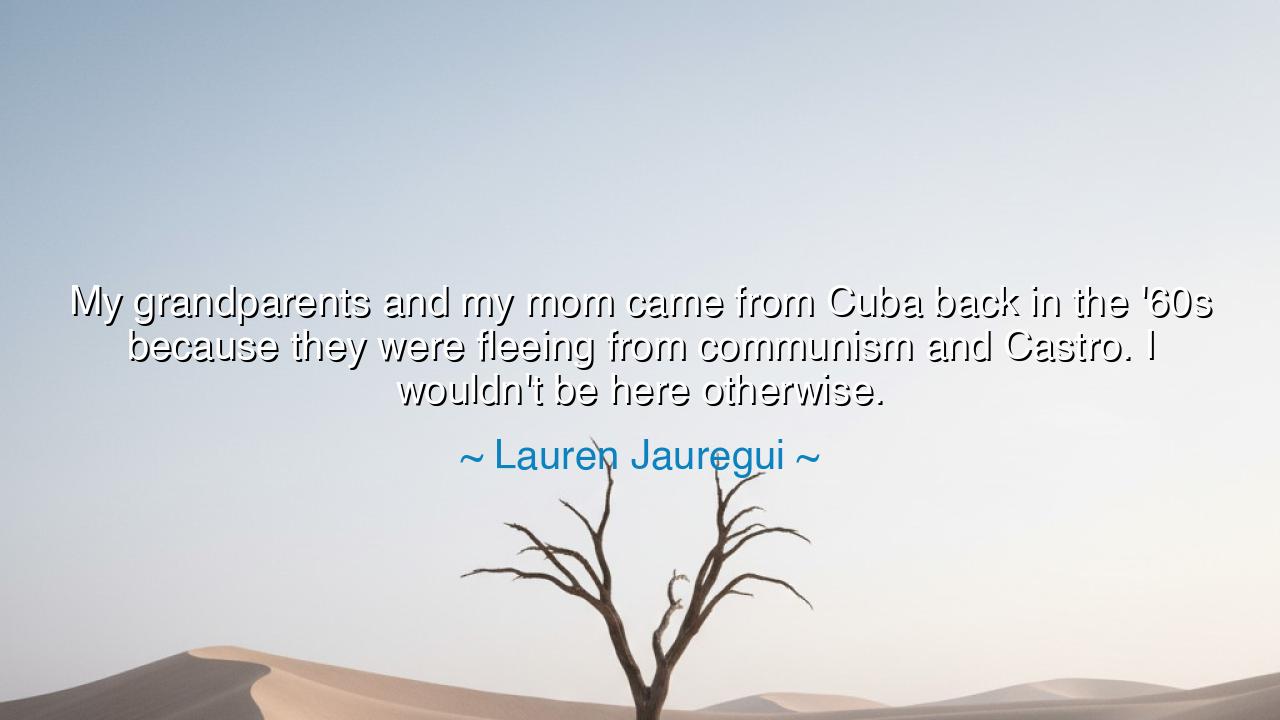
My grandparents and my mom came from Cuba back in the '60s
My grandparents and my mom came from Cuba back in the '60s because they were fleeing from communism and Castro. I wouldn't be here otherwise.






“My grandparents and my mom came from Cuba back in the ’60s because they were fleeing from communism and Castro. I wouldn’t be here otherwise.” — Lauren Jauregui
In these heartfelt and powerful words, Lauren Jauregui does more than recount her family’s history — she honors the courage that made her very existence possible. This is not merely a statement of ancestry; it is a hymn to sacrifice, to freedom, and to the enduring flame of hope that drives human beings to cross oceans and rebuild lives. Her grandparents and mother, fleeing communism and Castro, carried within them not only fear, but also faith — faith that somewhere beyond the horizon lay a future worth suffering for. And through their flight, a legacy was born — a life that would one day stand in the light, singing to the world.
The ancients would have recognized this story, for exile and endurance are among the oldest themes of human destiny. The tale of a family forced from their homeland, braving uncertainty for the promise of liberty, echoes the ancient exodus of Aeneas, who fled the burning ruins of Troy carrying his father on his back, his son by his side, and the gods in his heart. He wandered foreign lands to found Rome — a new world built on the ashes of the old. So too did Lauren’s forebears leave behind their beloved island, carrying not statues of gods, but the living spirit of courage. In that act, they forged not only a new life, but the continuation of their bloodline — the thread of existence that would become her own.
When she says, “I wouldn’t be here otherwise,” her words reveal the deep chain of cause and consequence that links generations. Every heartbeat in the present is an echo of someone’s decision in the past — a choice to move, to fight, to survive. The ancients called this fate, not in the sense of inevitability, but as the sacred tapestry woven by human will and divine purpose together. Her grandparents’ courage was the hand of fate guiding her life centuries before she drew her first breath. Their pain became her possibility. Their journey through darkness became her place in the light.
To flee one’s homeland is no small act. It is to tear one’s roots from the soil of familiarity and plant them again in the wilderness of the unknown. Cuba in the 1960s was a land of upheaval — its people torn between ideology and survival, many leaving behind everything they knew to escape oppression. It was not only a physical migration but a spiritual one — a crossing from fear to faith, from silence to self-expression. The ancients would have called such travelers pilgrims of the soul, those who move not for conquest but for the sanctity of freedom. Lauren’s lineage is therefore not only Cuban by birth, but heroic by nature.
Her reflection also carries a profound humility. Though she herself rose to fame and found her own voice in music, she does not forget the hands that paved her way. To say, “I wouldn’t be here otherwise,” is to bow before the altar of gratitude. It is to acknowledge that our lives are built on the unrecorded sacrifices of others — that every dream we live was once an act of courage made by someone we may never fully know. The ancients believed that to forget one’s ancestors was to lose one’s soul; but to honor them, to remember their trials and triumphs, was to draw strength from their spirit.
There is a powerful lesson here for all who listen: that freedom is never free, and every generation inherits the duty to guard it. Just as her family fled tyranny to seek liberty, so must we defend the right to speak, to create, to live as we are. The ancient philosophers taught that liberty is both gift and burden — that it must be nourished by gratitude, courage, and vigilance. Lauren’s words remind us that we are all heirs to struggles we did not fight, and it is our responsibility to honor them not in silence, but in action — by building, by creating, by lifting others as we were once lifted.
Let her story stand as a torch passed from hand to hand: that out of exile can come greatness, and from the courage of a few can bloom the freedom of many. For the journey from Cuba to a new life was not only her family’s voyage — it is the eternal journey of humanity itself: to rise from oppression toward hope, from loss toward legacy. And so, as the ancients would have said, remember the price of your blessings, and live in such a way that those who came before you would recognize their struggle made the world brighter through you.






AAdministratorAdministrator
Welcome, honored guests. Please leave a comment, we will respond soon